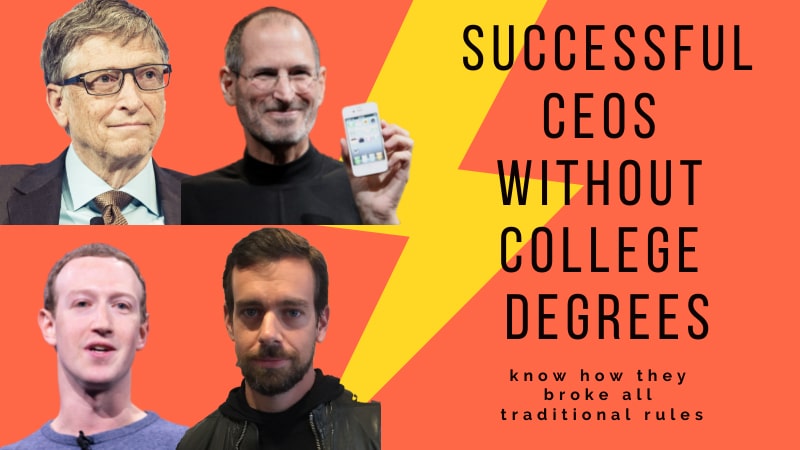We can say that there is almost a human tendency to link CEOs to how they broke all rules. The first and foremost rule that we expect them to break is, “you need to go to college to get a job”. Read ahead to find out more about these successful CEOs without college degrees, some interesting myths and facts about them; and most importantly; Can you be a CEO without a degree?
Join our discord server for more such content
Table of Contents
Most common degrees for CEOs
The most common way to become a CEO is through the conventional education system; so here are some of the most common degrees for CEOs.
Note that these are data of a few accomplished people and one of the roads in the journey of their lives. It won’t be and doesn’t have to be similar to yours.
The three most prevalent undergraduate majors among these CEOs are Economics,
Engineering and Business Administration. See below for the distribution of majors of all the
S&P (Standard and Poor) 500 CEOs.
| Science & Engineering | 141 |
| Biology | 6 |
| Computer Science | 6 |
| Engineering | 103 |
| Health Sciences | 6 |
| Sciences, n.e.c | 20 |
| Liberal Arts | 172 |
| Economics | 46 |
| English | 9 |
| History | 25 |
| Liberal Arts, n.e.c | 46 |
| Math | 17 |
| Political Science | 21 |
| Psychology | 4 |
| Sociology | 4 |
| Business | 143 |
| Accounting | 24 |
| Business Administration | 104 |
| Finance | 15 |
| Other (Education) | 1 |
| Unspecified | 37 |
| No Degree | 8 |
| Total | 502 |
By Patricia M. Flynn and Michael A. Quinn
This clearly shows how distributed the types of degrees are; and how there is no one degree that can take you right to the chair of the CEO. But it is important to see that Business Administration has a large impact, taking up 103 spots just by itself.
In an era where education and knowledge are considered more important than money and power; finding your forte and getting formal training in the same would be a bonus. So now that you know what degrees most CEOs have, and how it is not mandatory, let your education be a stepping stone and not a hurdle in your career.
Billionaires without degrees
What do Walt Disney, Steve Jobs, Bill Gates and Dhirubhai Ambani have in common? Actually, there are two answers. All of them are billionaires and none of them has held a college degree.
There are many names who created successful lives for themselves through hard work, creativity and luck; and were also bold enough to break the shackles of the conventional education system.
Even then, there are things we don’t know about, thanks to the media who decided to focus on the silver lining and not the dark clouds behind it. Here are some myths and facts about some successful entrepreneurs without a college degree:
1. Steve Jobs

Steve Jobs had no college degree. He dropped out of college and created Apple in his basement.
He dropped out of Reed College after just one semester but continued to attend by auditing his classes, which included a course on calligraphy. In a 2005 commencement speech, Jobs said, “If I had never dropped in on that single calligraphy course in college, the Mac would have never had multiple typefaces or proportionally spaced fonts.”
After dropping out in 1972, it took him two years to find a job, and then four more years to create Apple.
2. Bill Gates

Bill Gates dropped out of Harvard at the age of 20, founded Microsoft with Paul Allen, who is also a dropout.
At thirteen, Bill Gates wrote his first software program. He was a National Merit Scholar when he graduated from Lakeside School in 1973. He scored 1590 out of 1600 on the SATs.
Paul Allen attained a perfect SAT score of 1600 and was the main reason Gates dropped out of Harvard. They had a solid plan for starting a company and had no time to waste.
Bill Gates later said, “if things hadn’t worked out, I could always go back to school. I was officially on leave.”
3. Walt Disney
Walt Disney ended his formal schooling in 8th grade and became a hugely successful businessman.
Disney enrolled at McKinley High School and became the cartoonist of the school newspaper, drawing patriotic pictures about World War I. He also took night courses at the Chicago Academy of Fine Arts.
In January 1920, Disney, aged 18, and Iwerks started their own business, the short-lived Iwerks-Disney Commercial Artists. They failed and he had to work hard and wait till 1994 for another chance at succeeding in animation.
Other renowned successful CEOs without college degrees are:
4. Ritesh Agarwal, CEO of OYO Rooms

Ritesh hails from a family that used to own and operate a small business in Southern Odisha. He began selling SIM cards when he was 13 years old. In 2011, he traveled to Delhi for college after graduating from St. Johns Senior Secondary School.
He dropped out of college and was awarded the Thiel Fellowship in 2013 for his work on Oravel Stays, a budget accommodation service. He received a grant of $100,000 after which OYO Rooms was launched.
5. Michael Dell, CEO of Dell Technologies

He sought to take a high school equivalency exam at the age of eight in order to have a head start in business. His profits from part-time work were also invested in equities and precious metals.
Dell’s parents wanted him to be a doctor, so he enrolled in pre-med at the University of Texas in 1983 to appease them.
Dell gained $18,000 that summer by targeting certain communities for newspaper subscriptions rather than making cold calls. Dell dropped out of the University of Texas at the age of 19 after hiring numerous workers and achieving a gross profit of approximately $200,000 in his first year of operation.
6. Mark Zuckerberg, CEO of Facebook
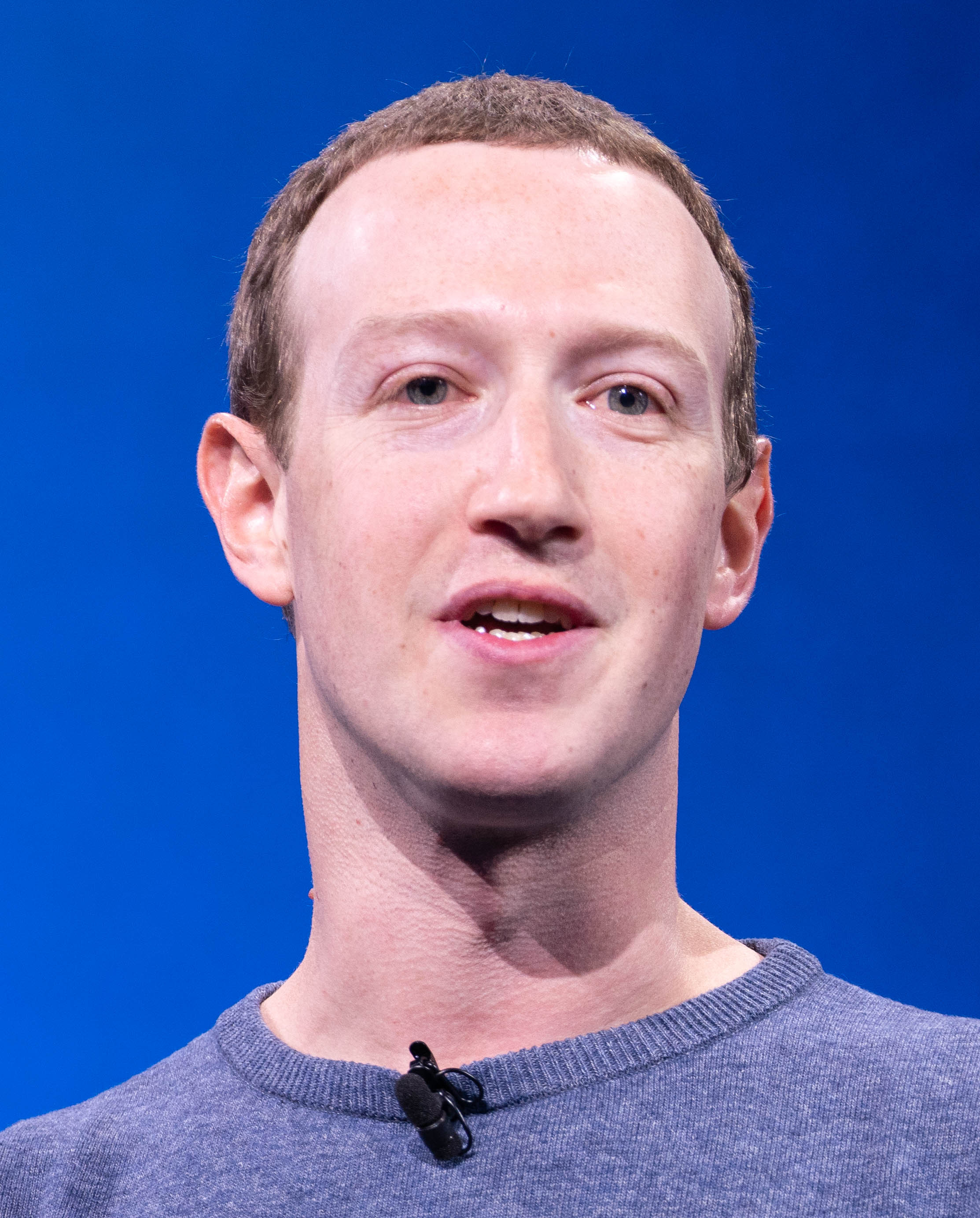
In February 2004, Zuckerberg founded the Facebook social networking website from his dorm room at Harvard University. Initially limited to a few college campuses, the site quickly grew in popularity and finally surpassed one billion users by 2012.
In May 2012, Zuckerberg took the firm public with a controlling stake. He became the world’s youngest self-made millionaire at the age of 23 in 2007.
7. Jack Dorsey, CEO of Twitter Inc.

Dorsey used to work as a fashion model when he was younger. Dorsey had developed an interest in dispatch routing by the age of 14. Taxicab firms still utilize some of the open-source software he developed in the field of dispatch logistics.
Dorsey started at the University of Missouri–Rolla in 1995 and stayed for two years before moving to New York University in 1997, where he dropped out two years later, one semester short of graduating. While at NYU, he came up with the concept that would eventually become Twitter.
8. Henry Ford, Founder of the Ford Motor Company

In 1879, when he was just 16, Ford left home to work as an apprentice machinist in Detroit, first with James F. Flower & Bros., and later with the Detroit Dry Dock Co.
In 1892, he completed his first motor car, powered by a two-cylinder four-horsepower motor, creating a revolution without any formal education about his craft.
9. Jan Koum, co-founder of WhatsApp
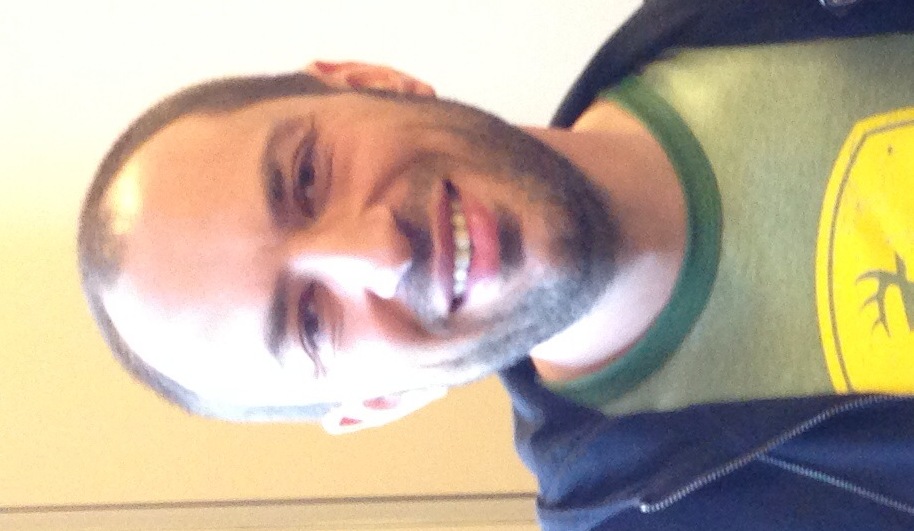
Koum was a troublemaker at school but by 18 had also taught himself computer networking by purchasing manuals from a used book store and returning them when he was done.
He enrolled at San Jose State University and worked at Ernst & Young as a security tester.
In 1997, he found himself sitting across a desk from Acton, a Yahoo employee, to inspect the company’s advertising system. Within a year, Koum was working as an engineer at Yahoo and the pair was on their way to being close friends.
10. Gautam Adani, Chairman of Adani Group
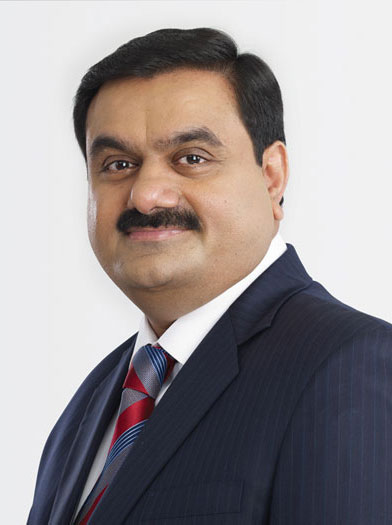
In 1978, as a teenager, Adani moved to Mumbai to work as a diamond sorter for Mahendra Brothers. He worked there for 2–3 years before establishing his own diamond brokerage firm at Zaveri Bazaar, Mumbai.
In 1985, he started importing primary polymers for small-scale industries. In 1988, Adani established Adani Exports, now known as Adani Enterprises – the holding company of the Adani Group. Originally, the company dealt with agricultural and power commodities.
As of November 2021, he is the richest man in Asia.
These few examples are enough to show that the answer to ‘can you be a CEO without a degree?’ is simply put, a yes. But instead of a degree, these creative minds had so much more to offer; whether it be prodigal skills or a solid plan for the future and the resources needed for the same. They have also worked harder than college-going students, managing multiple jobs and courses to expand their horizons.
And that is how they became successful CEOs without college degrees.
CEO education statistics
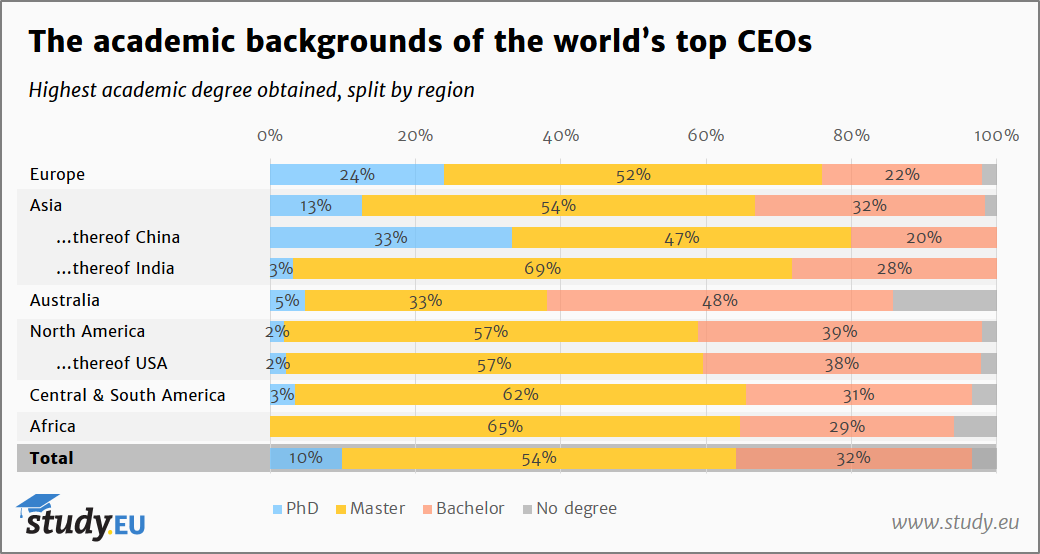
Here we can see clearly how educated most CEOs are, more than half carrying a master’s degree, while ten percent of them even have a Ph.D. in their focused subject.
But what the above statistics do not show is that most of them are CEOs who climbed the ladder of corporate. The household CEO names that we often hear about, the ones who dropped out or did not attend college; are mostly entrepreneurs who created their own company and thus became their CEOs.
How can I succeed without a degree?
This again proves that more than any qualification, your ideas, goals and drive are what makes you a leader. Leaders without degrees were never students who were uninterested in their education; they were just too interested in realizing their dreams. Leaders without degrees were never too lazy to pass their tests; they were too excited to work on their dreams instead.
If your path to the top doesn’t require you to impress a panel of a jury with certificates and experience, then you may as well start from a basement. But remember that, even Steve Jobs who started in his basement, had taken courses which he completely owes to, for much of his success.
Finally, how to become a CEO?
There are qualities that everyone looks for in a potential CEO, none of which a degree can buy you. It is true that some of these skills can be honed by formal training, but being a true leader is also a mandatory part of being a CEO. So, scroll down and see if you have what it takes to be a CEO:
A positive outlook
The individual must be able to think outside the box and devise ideas for efficiently combating the organization’s threats, while also motivating others to have a positive attitude and work hard to overcome obstacles.
Ability to take calculated risks
A CEO should be able to take calculated risks after thoroughly analyzing the probability associated with the decision’s profit and loss consequences.
Leadership qualities
A CEO, cannot be rash, and every line of action must be devised after rigorous yet quick consideration and study. A CEO must be able to not only plan successful change management strategies but also execute them in a way that increases the company’s profitability.
Coordination and communication
Instead of focusing on plans that he or she has devised, a CEO must be open-minded to ideas or strategies proposed by employees. A CEO’s communication abilities are mostly determined by his or her vocabulary, therefore a CEO with exceptional language skills is more likely to interact effectively with coworkers and subordinates.
Team worker
Yes, it is true that he is the leader of his team, but that shouldn’t make his subordinates feel a sense of being controlled or dominated by.
A CEO must convey to his or her coworkers and subordinates that their involvement in the decision-making process is highly valued. The final choice must be made only after a thorough financial and non-financial study of the issue, as well as consideration of how the decision will help the team accomplish the organization’s corporate goal.
Now that you know the stories of successful CEOs without college degrees and many others with degrees; the amount of passion and pain it takes to reach the top; and how you need to have your own plan and cannot depend fully on your qualifications; we hope this helped you make some decisions about how to take your next step towards the right direction.
“Your work is going to fill a large part of your life, and the only way to be truly satisfied is to do what you believe is great work. And the only way to do great work is to love what you do.”
Steve Jobs, Co-Founder of Apple

